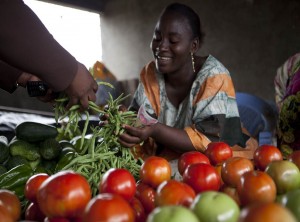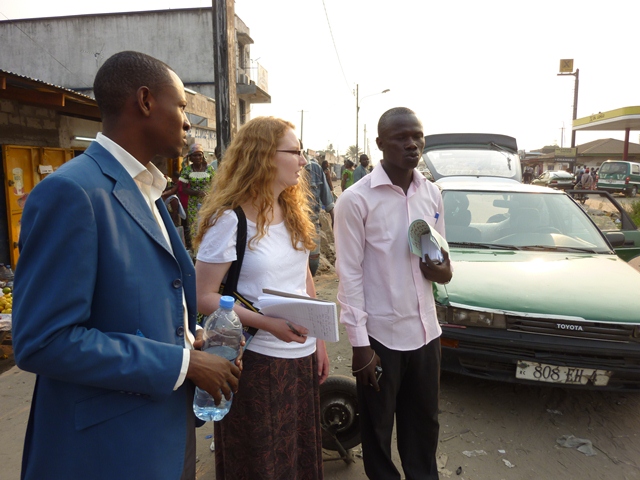Once this time was completed, Christie and I joined HOPE Congo’s spiritual integration officer, Precy Ngondui, as he hailed a cab that would take us to our first client meeting of the week. Cabs are plentiful and inexpensive in Brazzaville and are the preferred mode of travel for HOPE Congo’s loan officers. During the ride Precy explained that we planned to join the group Les Solidaires, which means The Solidarity, though if we arrived in time, we could first visit another group that was finishing its meeting in the same area. Continue Reading…
Archives For Spiritual Integration
We set out for Brazzaville to visit the HOPE Congo microfinance program and for Kigali to work with the Rwanda Savings and Credit Association (SCA) program. Every trip presents a diverse set of important activities and opportunities, some planned and some unexpected. But for this visit, we set out with four clear goals:
- Observe and support the 5W’s implementation. Both HOPE Congo and the Rwanda SCA program are implementing the 5W’s structure for group meetings. This structure was pioneered by HOPE’s partner in the Philippines, the Center for Community Transformation. Its purpose was to deliver a clear, consistent group meeting where biblical truth is shared every time a group gathers and where the financial aspects of the meeting are handled as efficiently as possible. For those of you who haven’t seen this before, the 5W’s consist of:
- Welcome – greet group members warmly in Jesus’ name
- Worship – open the meeting in prayer and sing worship songs
- Word – study the Scripture and provide time for group discussion
- Work – conduct biblically based business training and financial transactions
- Wrap-up – summarize key takeaways
- Deepen our partnerships with the local church. We scheduled meetings with key church leaders in each program. HOPE affirms the importance of the local church in God’s plan and wants to support and collaborate with the church wherever we work. Beyond this general affirmation, we must have clearly defined relationships in order to help seeking clients grow in Christ as disciples. This level of clarity is what we were pursuing with church leaders in each program. I will share more about our specific meetings in a separate post.
- Train field staff. In Brazzaville, our training was centered on identifying and finding solutions for the practical, operational challenges that loan officers face every day. These challenges include scheduling, tardy members, checklists, and reporting. You might wonder, “Why is the SI team getting involved in things like logistics?” Because it is often the practical, daily challenges that present the most persistent obstacles to a consistent witness for Christ. In Kigali, we helped lead a two-day staff retreat. The theme for SI was deepening our understanding and commitment to living as disciples and helping others become fully committed followers of Jesus.
- Strengthen relationships with the staff. These visits provide an important opportunity to build new relationships and deepen existing ones with our international and expatriate staff members. HOPE values relationships deeply, and nothing beats face-to-face time for really connecting at a heart level.
“For our struggle is not against flesh and blood, but against the rulers, against the authorities, against the powers of this dark world and against the spiritual forces of evil in the heavenly realms.” Ephesians 6:12

It’s been eight months since I’ve returned home from Rwanda, and one impression from the trip keeps coming back to me: Satan has never felt more real to me than he did in Rwanda. It wasn’t because the people I met seemed evil. On the contrary, it was because they were welcoming and wonderful, and without the influence of Satan, I can’t imagine how 18 years ago, these incredible people could have spent 100 days engaged in a gruesome slaughter of their neighbors, friends, and families. Continue Reading…
Over the next few days, I will be sharing some thoughts and reflections from my recent visit to Brazzaville, Republic of Congo and Kigali, Rwanda. The trip was incredible for a variety of reasons. God is transforming lives in amazing ways, and the teams in each program are doing a great job of steadily improving our spiritual integration (SI) efforts. So please tune in over the coming days, as I share the most meaningful thoughts and impressions from the trip.
There is a lot that has changed at HOPE since our founding in 1997. We’ve built our team. Added 15 more countries of service. Diversified our services. But our core beliefs have remained consistent.

- Charity is broken. Necessary for short-term relief, charity is like putting a Band-Aid on a broken bone. It doesn’t address the underlying issues of poverty—hopelessness, helplessness, and voicelessness. Instead it reinforces these mindsets long term. Our help can actually hurt those we’re attempting to serve.
- Job creation is a proven way out of financial poverty. Poverty was cut in half—from 52 to 26 percent—between 1981 and 2005. What happened? Economic opportunity in China, Brazil, and India have revolutionized poverty reduction. But it’s also common sense. A job is simply superior to a handout. Consistently, we hear this when we listen to the families we serve. They don’t want to be thrown another fish, but rather given the opportunity to start a fishing business.
- You can gain the whole world, yet lose your soul. Poverty is more than financial. At its heart, poverty is about relational brokenness: our separation from God and from each other. Jesus Christ calls us to restore relationships and has given us the message and the model through his life, death, and resurrection. We are fully committed to addressing not only physical poverty, but also spiritual poverty in all we do.
- Do one thing – and do it well. HOPE’s model works because it’s simple. We focus on one thing: excellent Christ-centered microenterprise development. Our model includes teaching biblically based business training, sharing the Word of God, providing access to small loans and savings services to those excluded from the formal financial sector.
Fifteen years ago, HOPE offered 12 loans to people in poverty. While so much has changed since then, our core beliefs have kept us anchored.








 “Hello – My name is Fabia, how are you today?” That is all it took for my wife, Anne, to decide where she would purchase her gas once we had moved to Kigali, Rwanda. Today, we both make a real effort to return and visit Fabia. It is not because of “high performance petrol” but to enjoy and encourage the kind interaction that comes with Fabia’s consistently great customer service.
“Hello – My name is Fabia, how are you today?” That is all it took for my wife, Anne, to decide where she would purchase her gas once we had moved to Kigali, Rwanda. Today, we both make a real effort to return and visit Fabia. It is not because of “high performance petrol” but to enjoy and encourage the kind interaction that comes with Fabia’s consistently great customer service.







